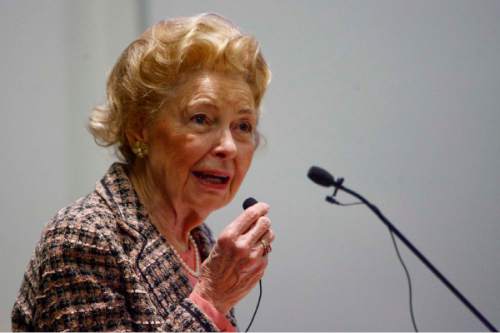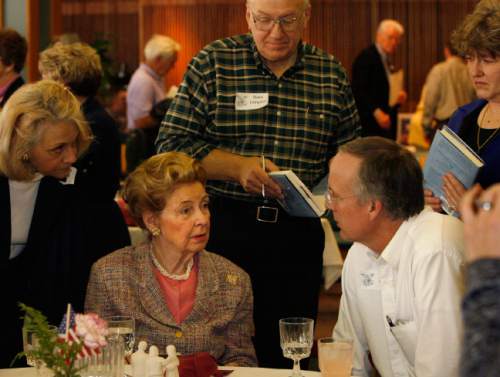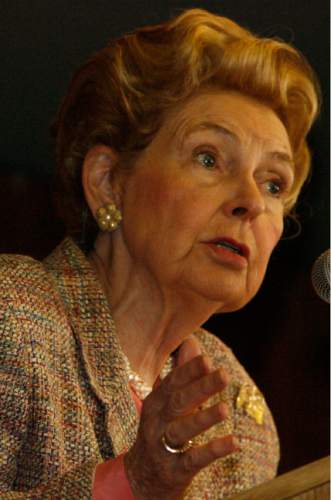This is an archived article that was published on sltrib.com in 2016, and information in the article may be outdated. It is provided only for personal research purposes and may not be reprinted.
It was 27 years ago that Phyllis Schlafly asked Gayle Ruzicka to be the president of the Utah Eagle Forum, and in that time, Ruzicka said, she developed a close relationship with her friend and mentor who died Monday at age 92.
"I've had a friendship with her all that time. I've stayed in her home, traveled with her over the years, and we talked on the phone," Ruzicka said. "She was a dear friend and someone I will miss dearly."
Schlafly rose to prominence in opposing the Equal Rights Amendment, and she led campaigns against communism and abortion, making her a fixture in social conservative circles and a polarizing figure on the political landscape.
Ruzicka called Schlafly an "Esther of our time," referring to the biblical queen who stood up to power and was a defender of the powerless.
Schlafly was an occasional visitor to Utah over the years, speaking at Utah Eagle Forum conventions periodically and sometimes speaking on Utah's Capitol Hill in support of conservative causes.
She helped rally opposition to Gov. Mike Leavitt's Conference of the States, a sort of precursor to the calls for a gathering to amend portions of the Constitution, and, Ruzicka said, helped defeat a proposed sex education bill in the Utah Legislature.
In 2010, Schlafly came to Utah for a fundraiser for Cherilyn Bacon Eagar, who was running for U.S. Senate at the time. Eagar had worked in Chicago on the campaign to stop the Equal Rights Amendment as a young mother, and she said they developed a close friendship. Eagar, who is a singer, had performed at birthday parties for Schlafly at the family home and produced video retrospectives on her work.
Eagar once spilled tomato soup on Schlafly's white table cloth, but Schlafly was gracious and unfazed, even though Eagar said she was hopelessly embarrassed.
"She was a role model and a mentor in the way she stood so strongly," Eagar said, which also garnered her criticism from her opponents. "When you are making a difference, you know a sign of that is when your detractors and opponents really go after you and attack you. It's not ever an easy thing to have happen, but, like her, I have learned to read it and move on."
Noted feminist and former Mormon activist Kate Kelly met Schlafly when Kelly was a young woman interning for a conservative political organization in Washington, D.C. Kelly remembers feeling "inspired by the way she was empowered to work and advocate for her political positions."
"Later in life I realized how damaging it is to have an anti-feminist with such a broad political platform who is a woman," Kelly said. "Her legacy is one of the really devastating effects on women, including, but not limited to, killing the Equal Rights Amendment."
In addition, Kelly notes, Schlafly questioned whether there could be such a thing as spousal rape, advocated for women to not work outside the home and took other stances on issues that Kelly said were damaging to women.
"She's not the role model for women or girls that I thought she was when I was younger," Kelly said.
Schlafly recently released a book that has drawn criticism from conservative circles, "The Conservative Case for Trump," in which she endorses and advocates for the Republican nominee.
It's an issue where Ruzicka disagrees with her friend.
"I pray for him, and that's what I do. I pray for a change of heart and humility," Ruzicka said. "I think we can hope. We need some hope he will be humble as president of the United States. … I pray for him every single day and pray for a miracle between now and the election."
Sen. Orrin Hatch, who backed Schlafly's crusade against the Equal Rights Amendment and has supported her views on other social causes, said in a news release that the "conservative movement has lost a towering icon in Phyllis Schlafly."
"For decades, she fought to protect human life and defend traditional values," Hatch said. "Whether we were working closely together or, on occasion, debating each other, I always respected her fearless advocacy and never doubted her sincere friendship."
In recent years, Schlafly's causes have suffered a string of setbacks, with the military integrating women into the ranks, the U.S. Supreme Court legalizing same-sex marriage and the Obama administration giving guidance on transgender students' use of bathrooms.
Those setbacks are on par with what the movement encountered when the Supreme Court ruled that abortion was legal in the case of Roe v. Wade, Ruzicka said, but Schlafly never gave up.
"We're all used to going through those things, and she would just stay positive and know we had to work harder than ever," Ruzicka said. "Over the years, we've had so many victories chiseling away at Roe v. Wade and it's not anywhere near what it started out to be, because of people like Phyllis. … The same thing is happening with the marriage issues."
Ruzicka last saw Schlafly at the Republican National Convention in Cleveland, where Schlafly came to observe the work of the platform committee, on which Ruzicka served and worked to have language added to the defense portion of the party platform.
Eagar also last saw Schlafly on the last night of the convention, and she helped her make her way in her wheelchair out of the convention center through the wall of people and balloons, realizing it might be the last time Eagar saw Schlafly alive.
"It was a mass of people coming out, so I decided I would break the wave of the coming mass of people so her wheelchair could get through," Eagar said. "We went a short distance and suddenly a hand reached out to me and we were holding hands the entire time, probably 20 minutes, to navigate through the back of the convention hall. … I had a strong feeling that was going to be it, and it was a very special time for me."
Twitter: @RobertGehrke







